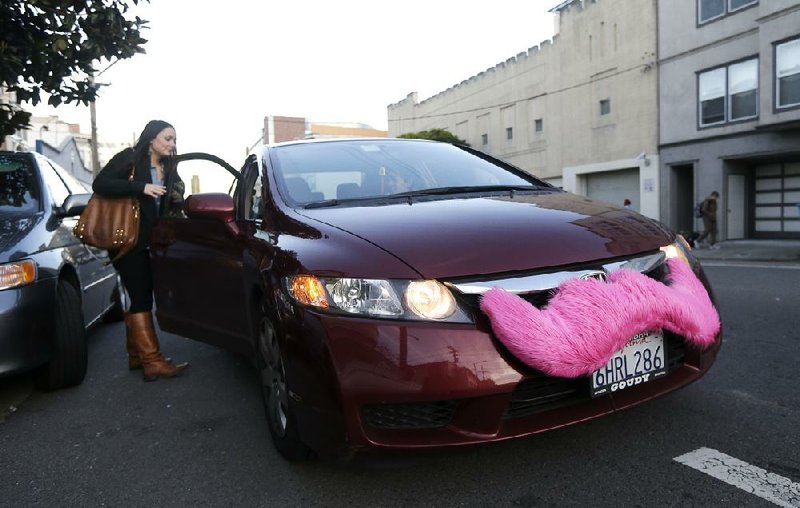BOSTON -- Boston is emerging as a battleground for Web-based businesses such as Airbnb and Uber, with some saying more regulations are needed to prevent the upstarts from disrupting communities and more-established industries.
Boston, prompted by the arrival of the mobile app Haystack, recently banned services that allow people to offer their public parking spaces for sale. Now the City Council is considering restrictions on ride-sharing services such as Uber, Lyft and Sidecar and lodging websites such as Airbnb, HomeAway and FlipKey, which allow users to book short-term stays in private residences.
Across the river in Cambridge, home to Harvard and MIT, officials have been trying for years to restrict ride shares.
From New York to San Francisco, cities are wrestling with the same questions and developing solutions such as outright bans or minimum safety requirements. Officials say the issue is balancing public safety and governmental oversight with the services' growing popularity.
But technology companies point out that the push for regulation is ironic in many technology-heavy cities that have built their reputations on cutting-edge ideas.
"For a city known for its innovation and progressiveness, it is shocking that Cambridge would cling so blindly to the past," Uber wrote on its website in June as it called on supporters to speak out against proposed regulations.
Andrea Jackson, the chairman of Cambridge's Licensing Commission, said Uber was oversimplifying the challenges that emerging business strategies pose to cities.
"We know that these things are likely here to stay," she said. "My only concern is that they are safe. I want to make sure the drivers have background checks. I want to make sure they have adequate insurance."
Safety mandates have been imposed in other cities. Chicago, for example, assesses licensing fees and requires ride-share companies to submit to background checks, vehicle inspections, driver tests and random drug screens of their employees. The companies are also required to obtain $1 million in commercial auto liability coverage.
Uber spokesman Taylor Bennett said the company understands the need for thoughtful regulations but will fight attempts to protect the local taxi industry.
Cab owners complain ride shares offer lower prices because they avoid licensing fees and other costly mandates imposed on their highly regulated industry. Boston-area cab drivers staged a noisy, rolling protest around Uber's downtown Boston office in May.
"Simply reacting to taxi or creating regulations or ordinances to protect taxi is protectionism, and that only serves one entrenched industry when consumers are clamoring for more and better options to get around town," Bennett said.
Bennett said Uber is focused on securing specific, statewide authority from legislators to operate in Massachusetts, as it has in Colorado and other states.
For short-term lodging services, cities have focused their energies on imposing local hotel taxes, establishing basic registration programs and making sure property owners meet minimum housing standards.
Austin, Texas, has set up a licensing system with an annual fee and limits on the number of units in a building -- or houses in a residential neighborhood -- that can be rented at a given time. Portland, Ore., allows single-family homeowners -- but not apartment and condo owners -- to offer short-term rentals as long as they complete a safety inspection and neighbor notification process.
In Little Rock, Mayor Mark Stodola has directed the city attorney to work with Uber to prepare an ordinance to present to the Board of Directors that would regulate and allow ride-sharing companies to operate in the city. The board has discussed the company, although no vote has been scheduled on granting it a business license.
Uber has advertised for drivers in Little Rock and sent company-issued iPhones to approved drivers.
Fayetteville police have issued traffic citations to Uber drivers, charging them with operating without a taxi permit, operating without public convenience and necessity, and operating without taxi inspection decals.
Brooks Rainwater of the National League of Cities, which is helping cities develop strategies to address new services, said it's not surprising that the most pitched battles are playing out in tech-friendly cities such as Boston and Cambridge.
The college students and young professionals that comprise a large part of their populations are usually the early adopters. Historical urban centers are the ones that tend to have outdated local codes.
"It's really a reflection of cultural shifts that are happening in cities globally. As society is speeding up, people are expecting services are their beck and call," Rainwater said. "The landscape is constantly shifting. ... Cities are actually working fairly swiftly to address these issues."
Information for this article was contributed by Philip Marcelo of The Associated Press and by Jack Mitchell of the Arkansas Democrat-Gazette.
A Section on 09/29/2014

